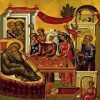In the ”Litany of Peace” of the Divine Liturgy, there follows in the third prayer a specific reference to peace, which is our main subject for today. In it, the Deacon proclaims: ”For the peace of the whole world, for the stability of the holy churches of God, and for the unity of all, let us pray to the Lord.”
It is through this prayer that the Church urges us, as a loving mother, to pray with love and focus for the welfare of others. Other believers, no matter where they live or how far away they may be, are our siblings in the one family of Christ. It is with great love that we embrace our fellow human beings, and we ask the Lord for them to enjoy the greatest gift of peace.
It is in this petition that we also ask the Lord to enjoy the fruits of His peace, namely the stability of the local Churches and the union of all in His truth.
When there are peaceful relations between the states of the world, then the local Churches also enjoy calm waters. In the peace of God the ship of the Church sails steadily to the undisturbed port of the Kingdom. That is why we ask Christ in the Divine Liturgy: ”Remember, Lord Your holy… Apostolic Church, from end to end of the inhabited world…end the schisms of the churches; Quench the ragings of the nations; speedily put down the uprisings of heresies by the power of Your Holy Spirit. Receive us into Your kingdom, declaring us to be children of the light and of the day. Grant us Your peace and Your love, O Lord, our God; for You have given us all things” (the Liturgy of St. Basil the Great).
The Church of Christ is, of course, one. But on the local level it is spread all over the world. In order to survive, since the Apostolic times, it has been organized in Local Ecclesiastical Provinces with a spiritual leader, the Bishop. The decisions of the Ecumenical Councils regulate with the help of special Rules (Canons), how a Diocese, Archdiocese, Metropolis or Patriarchate operates. Each Ecclesiastical Province bears the title of the City in which the Bishop resides, or of a wider province (or whole country). That is why we have, for example, the Holy Metropolis of Smyrna (derived from name of the city), the Holy Metropolis of Pisidia (derived from the name of the Province), and the Holy Archdiocese of Australia (derived from the name of the country). Something similar is found in the New Testament, where there is talk of the “Church of God in Corinth” (1 Corinthians 1: 2) or the Church of Galatia (1 Corinthians 16:1). It follows from this that Churches are considered as such because all of the individual Orthodox Christian Communities around the world adhere to Orthodox teachings (which include the Ecumenical Councils and Sacred Traditions), and the Bishops lead, in communion with the whole Body of Christ. All these Orthodox Churches are under obligation to the Founder of the Church, Christ, to stay firm in the faith and steadfast in what they have received from their predecessors.
Another fruit of peace is the unity of all in Christ. This unifying power of peace is also underlined by the Apostle Paul in his letter to the Ephesians: brethren, he tells them, ”make every effort to keep the unity of the Spirit through the bond of peace” (Ephesians 4:3).
Commenting on these words, Saint John Chrysostom writes:
”It is not possible for there to be unity of the Spirit in hatred and discord… For as fire when it finds dry pieces of wood burns up all together into one blazing pile, but when wet does not act at all nor unite them; so also it is here. Nothing that is of a cold nature can bring about this union, whereas any warm one for the most part can. And here – St. John Chrysostom continues – the Apostle Paul wishes the believers to be in communion with each other. Not just to make peace, not just to love, but to be one, one soul” PG 62: 72-3). Confusion and disturbances divide and tear one person apart from another, while peace unites the many. Peace unites us not only among ourselves, but also with God.
The deep desire of the human soul is for the Lord to unify our families and those brothers and sisters who are near or far, bringing us into indivisible union with Him. This is so we can never be separated from the love of our Lord. With this bond of peace, the faithful try to commune with each other and with God. This bond does not separate, it is not compulsive, but rather totally frees us. The faithful, when connected through the bond of peace and love, reach the infinite love of God through the Divine Liturgy.
My dear brothers and sisters, let us be carried on the wings of this sacred moment spiritually to the heavenly Jerusalem, to the night of the betrayal and arrest of Jesus, to hear what His last wish was for His Disciples and for all who would later be baptized and follow Him.
We see Jesus spiritually raising His hands and eyes to His heavenly Father and with great emotion praying fervently, saying: Now I am no longer in the world, but these are in the world, and I come to You. Holy Father, keep through Your name those whom You have given Me, that they may be one as We are. (John 17:11). “I do not pray for these alone, but also for those who will believe in Me through their word; that they all may be one, as You, Father, are in Me, and I in You (John 17: 20-21).
From what we have heard, we know the Lord’s final wish before His Passion. I hope you all agree that it is worthwhile for each of us to do all we can to maintain our unity with Christ and His Church, and with each other. Amen.
















